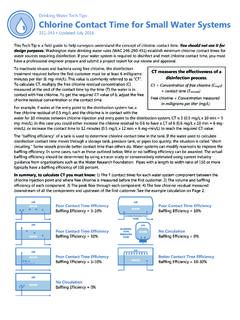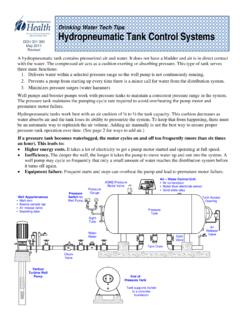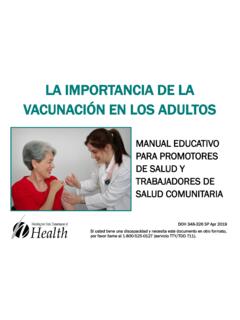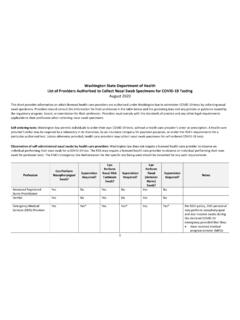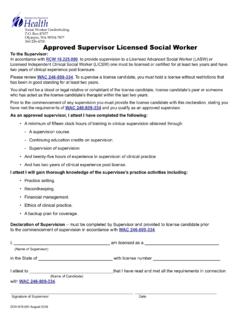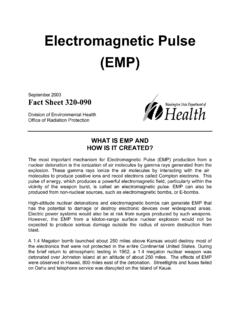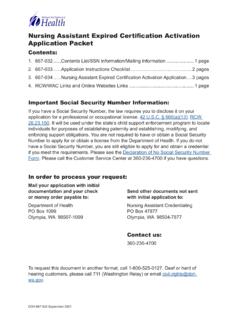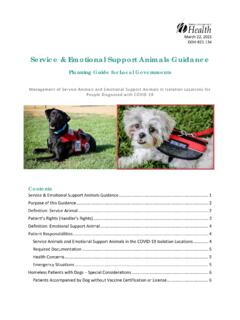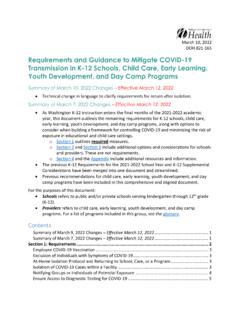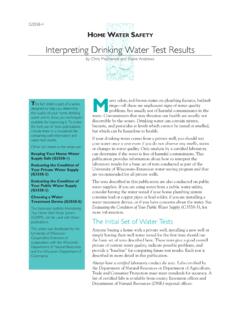Transcription of Important Information for Private Well Owners
1 Private Wells April 2019. ECY Pub. 06-11-021. DOH 331-349. (Revised). Information for Owners Contaminated wells Contaminants could show up in your drinking water , potentially putting your family's health at risk. Because you may not taste, smell, or see many types of contaminants, the state Department of Health (DOH) believes regular water testing is very Important . Legal rights to water State law says the waters of Washington belong to the public and are managed by the state. No individual or group can own the water , but they can get rights to use them. The Department of Ecology (Ecology) issues individuals or groups the right to use water . Private wells may be exempt from the groundwater permit system if they do not expect to withdraw a lot of water or do much irrigating.
2 Well construction standards State laws establish minimum well-construction standards. These laws require you to submit a Notice of Intent to Construct a water Well form and the appropriate fee to Ecology at least 72 hours before construction begins. Well water testing DOH recommends that Private well Owners test their drinking water every year for coliform bacteria and nitrate. These two contaminants rapidly could affect a person's health possibly even with just one drink of water . If your nitrate level is 5 milligrams per liter (mg/L) or higher, you may want to re-test in six months. We also recommend testing for arsenic once in summer and again in winter because seasonal influences can occur affecting your drinking water .
3 Though small amounts of arsenic do not cause rapid health effects, continued consumption over a relatively short time could lead to health concerns. If you own a Private well, you are responsible for testing your own water . In most counties when you sell a home supplied with a Private well, the county health or planning department or the lending institution involved will require you to provide water -sampling results to show the water is safe to drink. Contact your local county health or planning department for Information on the requirements and testing needed. Many certified labs in Washington perform these tests. The 2019 costs generally range from $20-$40. per test. Lab staff can answer questions and tell you how to collect water samples.
4 For a list of certified labs, visit Ecology online at You can search by analyte ( , contaminant) or by location. Testing results Contact your local health department for advice if the results of the tests show: coliform is present. You may need to fix a coliform problem by disinfecting the well, installing treatment, or repairing a portion of your piping. Nitrate in excess of 10 mg/L. For high nitrates, the concern is for infants younger than 12. months. Infants and pregnant women should not drink the water until the well has a treatment system that provides continuous water quality below the health standard. Arsenic higher than mg/L. For arsenic problems, you should try to find an alternative water source or use bottled water until treatment can be installed at the well, or in the house at the tap (point-of-use treatment).
5 These findings indicate areas where your water exceeds drinking water standards applicable to public water systems. When to test well water Test your well for coliform when: A household member has an unexplained illness. You hear your neighbor's well is contaminated or has a failing septic tank system. You notice a change in the water 's appearance, taste or smell. You replace or repair any part of your well system. When your well has been flooded. Test for nitrate when: A household member is an infant under 12 months old. A household member is pregnant, nursing, or trying to get pregnant. You live in area where fertilizers are, or have been, used near your well. Test for arsenic if: You live in an area known to have naturally occurring arsenic in the groundwater.
6 You know of neighbors that have high arsenic in their wells. water rights exemptions for Private wells A water Right Permit Exemption allows certain uses of small quantities of groundwater (most commonly, single home well Owners ) to construct wells without obtaining a water right permit from Ecology. In 2005, the Attorney General's Office issued a formal opinion to clarify the exemption from permitting requirements for four types of groundwater uses. 1. Watering livestock (no gallon-per-day limit or acre restriction). 2. Watering a Private lawn or garden less than acre (no gallon-per-day limit). 3. water for single homes or a small group of homes (limited to 5,000 gallons per day). 4. water for industrial uses, including irrigation (limited to 5,000 gallons per day, but no acre limit).
7 You should know: The limits of the exemption apply to all wells for any given project. For example, you cannot irrigate two acres by installing four wells (each serving acre) and cannot develop land and supply the commercial or domestic development with water from several wells under the exemption or without first obtaining a groundwater permit. The combined withdrawal from all ECY Pub. 06-11-021 Page 2 DOH 331-349. the wells cannot exceed the 5,000-gallon-a-day limit. If they exceed the limit, you must obtain a water right permit from Ecology. Even if water use falls under the permit exemption criteria, you may still apply for a water right permit from Ecology. Although exempt groundwater withdrawals do not require a water right, they are subject to state water law.
8 Ecology may place conditions on groundwater withdrawals when they interfere with prior, senior water rights. For More Information Department of Ecology These and other Ecology publications are online at Frequently Asked Questions: water Rights in Washington, #ECY 05-11-018. The Ground water Permit Exemption, #F-WR-92-104. Well Caps: Problems and Solutions, #ECY 096-BR-098. Surface Seals: Problems and Solutions, #ECY 096-BR-099. Wells Licensing, Construction, and Reporting Well Logs Location, Ownership, Construction Details Contacts: Scott Malone 360-407-6648. Well Construction and Licensing Office or (360) 407-6650. Ecology's Regional Offices Northwest Regional Office 3190 160th Avenue SE. Bellevue, WA 98008-5452.
9 425-649-7000. Southwest Regional Office PO Box 47775. Olympia, WA 98504-7775. 360-407-6300. Central Regional Office 1250 West Alder Street Union Gap, WA 98903-0009. 509-575-2490. Eastern Regional Office 4601 N. Monroe Spokane, WA 99205-1295. 509-329-3400. ECY Pub. 06-11-021 Page 3 DOH 331-349. Department of Health Office of Drinking water To order these and other publications: or 800-521-0323 (within Washington); or 360-236-3100 (outside of Washington). coliform Sampling Procedure, 331-225. coliform bacteria and Drinking water , 331-181. Correct Completion of a coliform Lab Slip, 331-247. Color, Taste and Odor Problems in Drinking water , 331-286. General Sampling Procedure, 331-219. Nitrate in Drinking water , 331-214.
10 Nitrate Sampling Procedure, 331-222. Treatment of Drinking water for Emergency Use, 331-115. Measuring water Levels in Wells, 331-428. U. S. Environmental Protection Agency For a list of drinking water contaminants, potential health effects, and sources of drinking water contamination visit #mcls or or call the safe drinking water hotline at 800-426- 4791. General Information for Private well Owners . NSF International Information on water quality and the special needs of well water users. water Systems Council Individual water wells and other Private well-based water systems. If you need this publication in an alternate format call 800-525-0127. For TTY/TDD call 711. ECY Pub. 06-11-021 Page 4 DOH 331-349.
